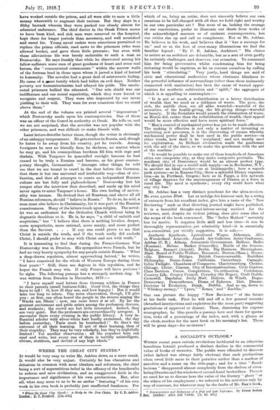WHERE THE GREAT CITY STANDS.* IT would be very easy
to write Mr. Ashbee down as a mere crank. It would also be very unjust. Certainly he has obsessions and delusions in common with most idealists and reformers, the chief being a sort of superstitious belief in the efficacy of the handicrafts to redeem end save civilization, and an exaggerated faith in the importance and significance of his own productions. But, after all, what may seem to UB to be an undue " featuring " of his own work in his own book is probably just unaffected frankness. For
leaden; P. T, Botsford. Pls. Eta Bar. London : Allen and Unlit]. f7s. ed. net.] which of us, being an artist, does not sincerely believe our own creations to be full-charged with all that we hold right and worthy in our own partionlar.art 7 But most of us, lacking the courage
of our convictions, prefer to illustrate our thesis from works of the acknowledged masters or of eminent contemporaries, lest our critics rise up and call us complacent. Not so Mr. Ashbee. He believes in his work, and believes that it "has a message for us," and so at the foot of over-many illustrations we find the familiar legend : " By C. R. Ashbee, Architect." His claims to notice as an architect are debatable, but as a sort of civic gadfly he certainly challenges, and deserves, our attention. To commend him for being provocative whilst condemning him for being irritating would be captious, so let us content ourselves by calling his book "stimulating." Very justly, hard things are said of civic and educational authorities whose obstinate blindness to the powerful influence of surroundings (other than those intimately connected with sanitation) has been the cause of wasted oppor- tunities for aesthetic cultivation and "uplift," the aggregate of which it is appalling to contemplate :—
" It is not so much a redistribution or a better distribution of wealth that we need as a riddance of waste. The poor, the rich, the middle class, are all alike wasteful—wasteful of the amenities, of the health-giving, the life-giving things—wasteful of beauty. If the Socialists would preach the elimination of waste, as Morns did, rather than the redistribution of wealth, their appeal would be more effective and have more spiritual force."
"Man's control of mechanical power has yet to be made effective. The making it effective is not only a matter of inventing or exploiting new processes, it is the discovering of means whereby mechanical power shall be best used in the public service—in other words, how shall it be 'socialized,' and not merely used for exploitation. As Hellenic civilization made the gentleman with the aid of the slave, so we make the gentleman with the aid of the machine."
"It would be possible to make out of these hundreds of American cities one composite city, as they make composite portraits. The resultant city of Democracy would be an almost perfect type. We should find in one a model milk supply—as in Rochester, N.Y., in another an ideal market—as at Indianapolis • here a superb park system—as in Kansas City, there a splendid library organiza- tion—as in Portland, Oregon ; here as in Fargo, a live network of village theatres for the encouragement of Drama as a force in rural life. The need is synthesis ; every city could have what any city has."
Mr. Ashbee has a very distinct penchant for the ultra-modern He even quotes Blast. Let us indulge his humour and, by a string
of extracts from his excellent index, give him a taste of the "New
Reviewing" such as that diverting journal might have published. It is a beautiful thought-and-labour-saving method for the reviewer, and, despite its violent jolting, does give some idea of
the scope of the book concerned. The "Index Method" certainly has its merits. It requires little skill and less time—it can be thoroughly representative, yet admirably brief—it is essentially non-committal, yet vividly suggestive. It is safe :—
Aesthetic Synthesis. Agricultural Wages. Aldermen. Alice in Wonderland. Aristotle. Arnold. Art Galleries. Artist Craftsmen. Ashbee (C. R.). Athens. Autocratic Government. Balfour. Ballet (Russian). Ilalzac. Barker (Granville). Battle of the Somme. Belgium. Bennett (Arnold). Berlin. Big Business. Birmingham. Blast. Board of Public Welfare. Boccaccio. Boston (Mass.). Bourn- villa. Brbwers. Bridges. British Commonwealth. Buddhist Philosophy. Burns-Jones. California. Canterbury. Carnegie. Celtic Twilight. Chambers of Commerce. Charlottenburg. Chelsea. Chicago. Christ: Cinema. City of Internationalism. Civic Centres. Class Barriers. Cocoa. Competition. Co-ordination. Coriolanus. Country. Life. County Council. Coverley (Sir Roger). Craft Guilds. Cromwell. Daedalus. Daily Mail. Dakota. de Windt. Degas. Democracy. Demosthenes. Diana of Ephesus. Dirt. Disease. Doctrine of Evolution. Drink. Dublin. And so on, down to "Whiskey-money," "Ypres," "Zones," and" Zueblin."
One can picture the happy "New Reviewer" of the future at his facile task. First he will reel off a few general remarks (detached interjections and expletives for the most part) suggesting gradations of approval or dissent. Then, dismissing his express stenographer, he blue-pencils a passage here and there for quota- tion, ticks off a percentage of the index, and, with a glance at the clock, reaches for the next book on his morning's list. Those will be great days—for reviewers I


































 Previous page
Previous page